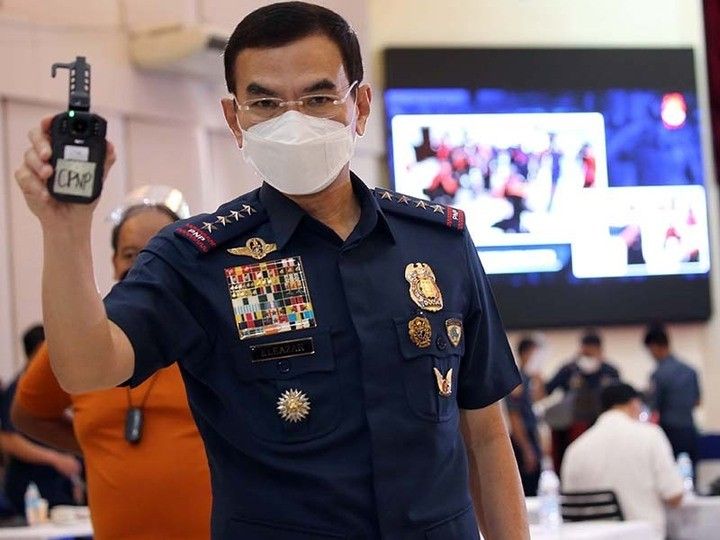PNP chief claims data privacy was prioritized in bodycam use

MANILA, Philippines — The Philippine National Police defended its rollout of body-worn cameras Tuesday, claiming that mechanisms are already in place for data management and privacy in the use of the cameras in police operations.
Police Gen. Guillermo Eleazar, PNP chief, said that the technical working group, which was tasked to incorporate the protocols created by the Supreme Court with the rules crafted by the PNP, is also making sure that data privacy issues are all addressed.
This came after the Commission on Human Rights said it had “high hopes” that the body-worn cameras would result in more transparent police operations but expressed wariness over the newfound implications that came with the technology, including the subject of data privacy.
“I assure the CHR that in the crafting and issuance of the Supreme Court’s guidelines on the use of body-worn cameras, data management and privacy were given primary importance in our honorable Justices’ deliberations,” Eleazar said in a statement sent to reporters Tuesday.
"The Supreme Court's resolution includes the importance of data privacy and the protection of information gathered using body-worn cameras," the PNP chief added.
What do the rules say about data privacy?
"Law enforcement must remain mindful of the future challenges, especially on data management and privacy concerns, involving the use of the technology as this has been an unexplored area in our law enforcement and criminal justice system," CHR spokesperson Jacqueline de Guia said Monday.
Rule 3, Section 4 of the Rules on the Use of Body-Worn Cameras promulgated by the Supreme Court reads:
When conducting a search by virtue of a warrant, the officers wearing the body-worn cameras or alternative recording devices shall, as early as practicable, notify the lawful occupants of the premises to be searched that the execution of the search warrant is being recorded.
Rule 4, Sections 3 and 4 go on to say:
Data recorded by body-worn cameras and alternative recording devices are not public record subject to disclosure, unless the recordings involve an incident resulting in a loss of life or an assault made on law enforcement officers during the arrest or search.
When sensitive information and images appear in the recordings...it shall be the duty of the data custodian or his or her authorized representative to redact such information, images, and other personal identifiers of the person appearing in the recordings for his or her protection.
Section 6 of the same rule also requires the consent of the arrest or affected parties before recordings can be used in a court proceeding. Consent may only be asked in the presence of counsel.
If the person consents or stays silent, “the recordings may be used by and against him or her in a court proceeding,” it added. If the person declines, recordings may not be used.
The same rules require law enforcement agents implementing arrest and search warrants to use at least two recording devices during the conduct of their operations and prescribe penalties for erring cops.
Mechanism for accountability?
At the onset of his term, Eleazar expressed hope that the newly-acquired body cameras would prevent abuse by cops and keep erring cops accountable.
The rules came amid mounting calls for safeguards on rules they claimed have been weaponized against dissenters and activists.
Just last month, the PNP distributed a total of 2,696 body cameras to 171 city police stations and offices nationwide.
According to the police chief, the police force needs more or less 30,000 body-worn cameras so that all police stations and units will be provided with them for use in operations.
“Our coordination with the National Privacy Commission regarding this matter will also continue,” he said.
READ: Watchdogs laud SC bodycam rules but wary of possible gaps
— with a report from Kristine Joy Patag
- Latest
- Trending




























